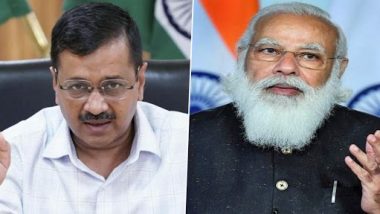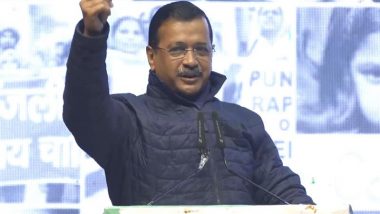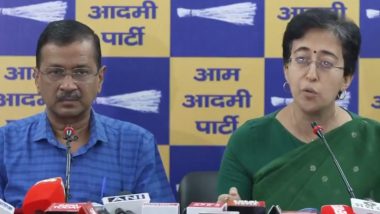New Delhi, March 16: The Centre on Monday tabled the new Bill in Lok Sabha, which is an amendment to the Government of National Capital Territory (NCT) of Delhi Act, 1991. The National Capital Territory (NCT) Bill gives discretionary powers to the L-G even in matters where the Legislative Assembly of Delhi is empowered to make laws. It seeks to better define the role of the Council of Ministers and the L-G in Delhi. The introduction of the Bill in the lower house of the Parliament has drawn flak from the AAP government and also from several opposition parties.
As a mark of protest, AAP members staged a protest in front of the Gandhi Statue in Parliament premises on Tuesday. The tussle between the Centre and AAP government in Delhi revived as the Centre introduced the bill in parliament. After the Centre's decision, Delhi Chief Minister Arvind Kejriwal and Deputy Chief Minister Manish Siosida accused Modi of an attempt to run the Delhi government from the back door, giving more power to the LG. Taking to Twitter, Kejriwal said the Bill, which “seeks to drastically curtail powers of the elected government”, is “against” the Supreme Court judgment.
What is the NCT Bill
- The Government of National Capital Territory of Delhi (Amendment) Bill, 2021 or the NCT Bill proposes to amend the Government of National Capital Territory of Delhi Act of 1991. The Centre has brought this bill “in the context of the judgment dated 14.02.2019 of Hon’ble Supreme Court (Division bench) in Civil Appeal No 2357 of 2017”.
- As per reports, the Bill is proposed to give more powers to the L-G. The Government of National Capital Territory of Delhi (Amendment) Bill, 2021 states that the "government" in the city would mean the "Lieutenant Governor" in context of any law to be made by the legislative assembly.
- Under the present administrative set of Delhi, the law and order and police come under the home ministry while administrative affairs fall under the Delhi government.
- The NCT Bill 2021 aims to demarcate the powers of the Lieutenant Governor (L-G) of Delhi and those of the chief minister on the lines of the Supreme Court ruling.
- The introduction of the Bill means the L-G will have more powers in Delhi which may result into the curtailment of the powers of the chief minister in Delhi.
- The NCT bill provides for the Delhi government to send its legislative proposals to the L-G at least 14 days in advance, and asks the elected government to avoid delays.
- The L-G holds the power to refer a bill to the Centre/President where he or she disagrees with the elected government of Delhi.
"When a bill has been passed by the legislative assembly, it shall be presented to the lieutenant governor and the lieutenant governor shall declare either that he assents to the bill or that he withholds assent therefrom or that he reserves the bill for the consideration of the president..." the bill said.
The bill that was introduced by Union Minister of State for Home G Kishan Reddy in Lok Sabha makes it mandatory for the Delhi government to take the opinion of the lieutenant governor (LG) before any executive action in the national capital.
The tussle between LG and Delhi Govt:
- Arvind Kejriwal and his Cabinet ministers had staged a sit-in at the lieutenant governor’s office in June 2018. This intensified the power tussle between the then lieutenant governor and the AAP government.
- The Supreme Court had in July 2018 ruled that the lieutenant governor cannot interfere in every decision of the Delhi government and that he must act on aid and advice of the council of ministers.
- Since the 2018 judgement, there have been no major flashpoints between the Arvind Kejriwal government and the BJP-led central government.
- However, the Centre's move to introduce the bill in Lok Sabha on Monday is likely to revive the power tussle between the two sides.
Several opposition parties have come in favour of the Arvind Kejriwal government over the NCT Bill, terming it 'unconstitutional'. The Congress has termed the bill as retrograde, anti-democratic and an insult to the people of Delhi. Taking to Twitter on Tuesday, senior Congress leader P. Chidambaram said: "The demand is for enlarged legislative powers to Delhi and the will of the people. On the contrary, the proposed amendments will make the Delhi government less than a municipality and rob the people of any kind of representative government.
Watch Video: Lok Sabha: Bill Introduced To Give More Power To Delhi LG, Arvind Kejriwal Calls It Unconstitutional:
Manish Tewari, Congress leader tweeted saying, "Government of National Capital Territory of Delhi (Amendment) Bill 2021 effectively buries democracy in Delhi 10 fathoms deep. If passed elected govt and Assembly would be mere petitioners in L-G's Durbar". Congress leader Kapil Sibal also took to Twitter and stated that the National Capital Territory of Delhi (Amendment) Bill, 2021 violates the federal structure of the constitution.
Omar Abdullah, National Conference leader and former Jammu and Kashmir CM extended his support to the Delhi government. "In spite of AAP's support for the dismemberment & downgrading of J&K in 2019, we still condemn this assault on the powers of the elected government of Delhi. Delhi deserves to be a full state with all powers exercised by the elected government & not a nominated LG," Abdullah tweeted.
(The above story first appeared on LatestLY on Mar 16, 2021 04:59 PM IST. For more news and updates on politics, world, sports, entertainment and lifestyle, log on to our website latestly.com).













 Quickly
Quickly



















